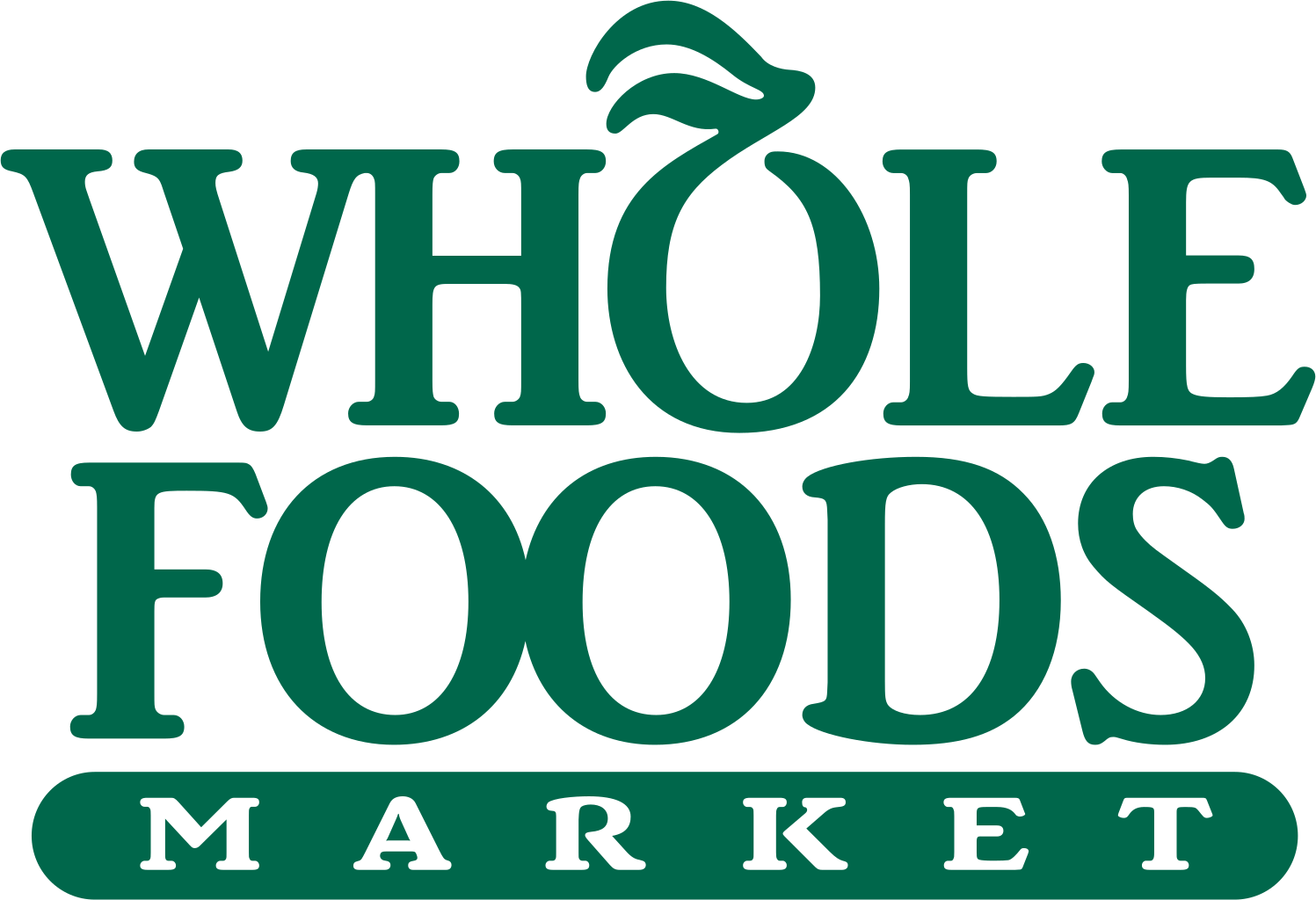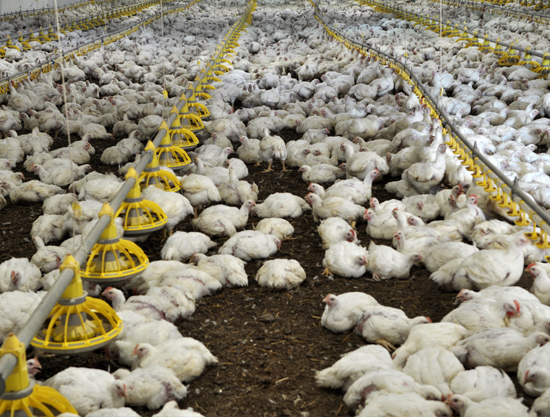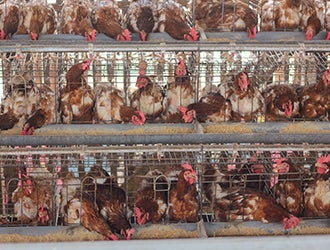Assessing supermarkets’ policies, progress and products on critical farm animal welfare issues
Published August 2024
The second annual ASPCA Supermarket Scorecard graded the largest U.S. grocery store chains’ farm animal welfare policies, progress reporting and store branded products on the extent to which they address critical animal welfare issues for chickens raised for meat (also known as broiler chickens), egg-laying hens and pregnant pigs.
This year’s Supermarket Scorecard builds on last year’s inaugural ranking by evaluating additional grocery chains on their commitments to ban inhumane farming practices from products sold in their stores. In addition, the 2024 scorecard incorporates a new assessment of whether companies are eliminating these practices from their own brands, whose supply chains they directly control. To learn more about why supermarkets’ own brands are an opportunity to improve farm animal welfare, read our blog.
Supermarket Scores
*Indicates a store that did not have products with their own store brands for all categories within the scoring criteria. Their raw scores were adjusted and weighted accordingly so as not to penalize them in comparison with others. For more info, see the Methodology section.
Key Findings
One of the ways that supermarkets can yield their enormous influence on farm animals' lives is by making a public commitment to phase out inhumane practices, signaling to their suppliers that they will have to change practices to continue to sell in their stores. Policies are more powerful in spurring positive change when they are publicly available, specific and time-bound. Publicly reporting progress toward achieving these goals demonstrates effort and accountability to both shoppers and the farmers in their supply chain. When stores choose to offer higher-welfare options within their own brands, such as cage-free eggs, slower-growing chicken, or gestation crate free pork, this is an indicator of the stores’ corporate values and an embodiment of animal welfare policies.
The Good News
Good movers: Two supermarkets received A or B grades this year based on their farm animal welfare policies, progress reporting and store brand products. Notably, Whole Foods Market was the first supermarket to introduce a Better Chicken Project-certified chicken product, and Sprouts Farmers Market was the first to report on breed progress this year.


The Bad News
Poor performers: Four supermarkets — Piggly Wiggly, Save A Lot, Trader Joe’s and Winn-Dixie — scored a zero on farm animal welfare policies and progress in both the 2023 Supermarket Scorecard and in this year’s Scorecard. Despite near-universal consumer concern about farm animals’ welfare, these stores are failing to make even the most basic commitment to ensure animals in their supply chains are not suffering. This puts them out of step with their customers and their peers.
Take one minute to ask these stores to stop being cagey about farm animals!
Tips for Shoppers
No matter where you live, you can find products that are audited to meaningful animal welfare certification standards on the ASPCA Shop With Your Heart Grocery List, including products like eggs, chicken, and pork as well as plant-based substitutes. You may also find welfare-certified farms in your area on our welfare-certified farms directory. If you lack local higher-welfare options, there are grocery delivery services that have committed to welfare-certified sourcing.
For the supermarkets assessed in this scorecard, here are some specific store brands to note:
Higher-Welfare Store Brand Chicken
- Whole Foods Market sells the Better Chicken Project Pasture-Raised Whole Chicken under their Whole Foods Market brand, which is both welfare-certified by Global Animal Partnership and, most importantly, uses a healthier chicken breed.
- ALDI has a line of organic Simply Nature chicken that is certified by the Global Animal Partnership, which meets all of the housing components of the Better Chicken Commitment (better lighting and litter conditions, more space, and added enrichment) but the chickens are still fast-growing birds.
- H-E-B scored an F for their first year in the Supermarket Scorecard, and while this does not improve their score this year as it doesn’t meet the Scorecard criteria, they have a line of Central Market organic air-chilled chicken that is certified by Certified Humane®, which meets some of the housing standards listed in the BCC. However, those chickens are still fast-growing birds.
Higher-Welfare Store Brand Eggs
- All of the store brand eggs at the following seven stores were found to be cage-free: Costco, Giant Eagle, Sam’s Club, Sprouts, Trader Joe’s, Whole Foods Market and Winn-Dixie. All of the other supermarkets assessed (except Piggly Wiggly) offer at least one cage-free option within their store branded eggs: Look carefully on egg cartons for the “cage-free” claim to ensure hens aren’t confined in inhumane battery cages.
- Some stores even go beyond cage-free with meaningfully welfare-certified store brand eggs, which provide additional assurances for animals. Find a full list of Certified Humane egg options by store on our Shop With Your Heart Grocery List. Some examples of the highest welfare store-brand eggs include:
- Kroger’s store brand, Simple Truth + Kipster, audited by Certified Humane and offering unique transparency into farm environments.
- Welfare-certified store brands that offer pasture-based options - look for the pasture raised claim to confirm: Albertsons’ O Organics eggs, ALDI’s Goldhen eggs, H-E-B's Central Market eggs, Safeway’s O Organics eggs, ShopRite’s Bowl & Basket eggs and Weis Markets’ Weis Quality eggs.
Higher-Welfare Store Brand Pork
- Whole Foods Market’s 365 by Whole Foods and Whole Foods Market pork products are both certified by Global Animal Partnership, which prohibits both gestation crates and farrowing crates.
- We found several value-added claims on pork products that are either meaningless or provide a consumer with little value or product differentiation (such as “gluten free” or “all natural”). We also found claims referring vaguely to how the pigs were raised, such as “socially housed”, but these terms are often undefined or weakly regulated. To find crate-free pork products and plant-based substitutions, use our Shop With Your Heart Grocery List.



